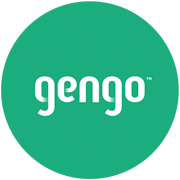Mygengo
 |
|
| Language translation via crowdsourcing | |
| Industry | Translation |
| Founded | 2008 |
| Founder | Robert Laing and Matthew Romaine |
| Headquarters | Tokyo, Japan and San Mateo, California |
| Services | Translation, API |
| Website | http://www.gengo.com/ |
Gengo is a web-based human translation platform headquartered in Tokyo. The platform currently draws from a network of approximately 20,000+ pre-tested translators working across 37 languages. Translations can be ordered via direct order or API integration. The company name, "Gengo," comes from the Japanese word for "language."
Users can order translations through Gengo's direct order form or API. Gengo’s API was launched in April 2010. It allows developers to integrate Gengo’s translation platform into third-party applications or web sites and is aimed at the translation of dynamic content such as blog posts and product descriptions on e-commerce sites. The API is integrated with services such as YouTube and Drupal.
Gengo was founded in 2008 by Matthew Romaine and Robert Laing. Prior to starting Gengo, Matthew was an audio research engineer and translator with Sony Corporation, and Robert headed Moresided, a UK-based design agency. Prior to its early 2012 rebranding, the company was known as "myGengo."
Gengo's translation platform is supported by a worldwide team of 20,000+ translators. To become a Standard-level Gengo translator, individuals must pass an exam crafted by native speakers. Translators must take additional Pro exam to complete orders at that level. Translation quality is monitored with a translator scorecard.
The company's initial $750,000 seed investment round concluded in September 2010. Investors included Dave McClure of 500 Startups, last.fm founder Felix Miller, Delicious founder Joshua Schachter, Brian Nelson (CEO at Japan-based ValueCommerce), Pageflakes co-founder Christoph Janz, Benjamin Joffe (CEO at China-based Plus Eight Star), and a number of Japanese angel investors. This was followed by a further seed funding round of around $1,000,000 in mid-2011.
A $5.25 million Series A round led by Atomico and joined by 500 Startups ended in September 2011, followed by an early 2013 Series B investment of $12 million led by Intel Capital.
...
Wikipedia
